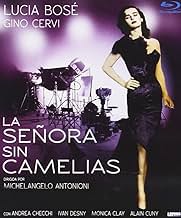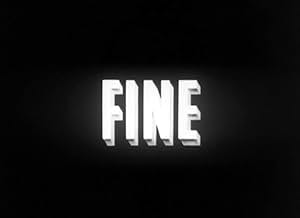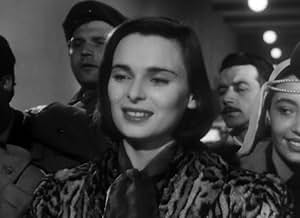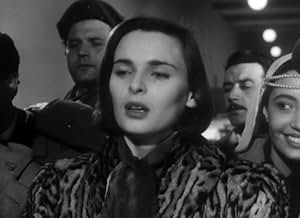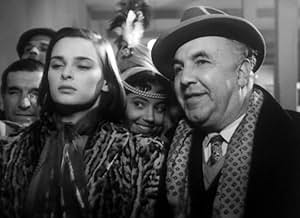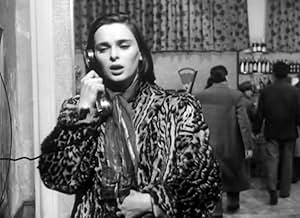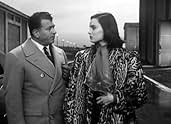IMDb-BEWERTUNG
7,1/10
2422
IHRE BEWERTUNG
Füge eine Handlung in deiner Sprache hinzuA new starlet is discovered and has ups and downs in Italian films.A new starlet is discovered and has ups and downs in Italian films.A new starlet is discovered and has ups and downs in Italian films.
- Auszeichnungen
- 1 wins total
Antonio Acqua
- Movie Theatre Owner
- (Nicht genannt)
Emma Druetti
- Simonetta Rota's Mother
- (Nicht genannt)
Rita Giannuzzi
- Simonetta Rota's Friend
- (Nicht genannt)
Vittorio Manfrino
- Clara Manni's Father
- (Nicht genannt)
Empfohlene Bewertungen
A usually neglected Michelangelo Antonioni early film, "The Lady without Camelias" is a caustic story about a beautiful Milanese shop clerk (Lucia Bosé) who briefly becomes a movie star. She soon discovers than she is fenced in and humiliated, with a new and rich husband who can't tolerate her romantic scenes -- he prefers her to play Joan of Arc, with disastrous consequences.
It is actually one of the cruelest and most accurate portraits of studio film-making and the Italian movie world. As the film develops, it only gets better, the last scene being a little masterpiece of its own. Michelangelo Antonioni, who had already worked with Bosé on "Chronicle of a Love Affair", offered her the part of Clara after Lollobrigida (and, it is said, Loren) had turned it down, and she does wonders in one of her best parts on the silver screen. I have never been really touched by Antonioni's (much more famous, much more serious) Trilogy, but I have enjoyed this "minor" work. Compared to later Antonioni, the film feels crowded, yet some of the director's favorite themes are already there (most notably, misunderstanding between men and women, and masculine weakness). For those (like me) who always found Antonioni quite hard to follow in his later films, try this bitter tale in post-war Italy, I think it gives a different and lighter approach to this director's work.
It is actually one of the cruelest and most accurate portraits of studio film-making and the Italian movie world. As the film develops, it only gets better, the last scene being a little masterpiece of its own. Michelangelo Antonioni, who had already worked with Bosé on "Chronicle of a Love Affair", offered her the part of Clara after Lollobrigida (and, it is said, Loren) had turned it down, and she does wonders in one of her best parts on the silver screen. I have never been really touched by Antonioni's (much more famous, much more serious) Trilogy, but I have enjoyed this "minor" work. Compared to later Antonioni, the film feels crowded, yet some of the director's favorite themes are already there (most notably, misunderstanding between men and women, and masculine weakness). For those (like me) who always found Antonioni quite hard to follow in his later films, try this bitter tale in post-war Italy, I think it gives a different and lighter approach to this director's work.
Personally more appreciate and recognise Michaelangelo Antonioni for his influence in film rather than love him, but still consider him an interesting director and understand completely his appeal. His films are extremely well made and interesting on a thematic level (some like urban alienation being ground-breaking) and his directing style is unique. As has been said more than once though, his style and films are not for all tastes though, for while his films fascinate and transfix many they alienate and perplex others, both sides understandable.
'La Signora Senza Camelie' may not be one of his most best-known or most important films, other films of his may have scenes with slightly more staying power and explore their themes more broadly and deeply. Even though it is an early effort and made when he was still settling his style, 'La Signora Senza Camelie' is unmistakable Antonioni and still is a great film, if not quite extraordinary. Not one of his very best overall, but for me it is among his best of his early films. It is one of his more accessible films, one of the easiest to connect with emotionally for me and it had clearer and more individual character/story development than other films of his. Also he doesn't try to do too much here and he doesn't hammer the points home too hard that it feels heavy-handed.
Visually, 'La Signora Senza Camelie' is very striking. The black and white still looks stunning, the scenery is wonderfully vivid in every frame and the photography often leaves one in awe. A big example being agreed in the rehearsal scene. The music is thankfully the kind that complements rather than clashes and has no trouble fitting with the tone and atmosphere.
The writing didn't come over as rambling to me and instead came over as sincere and thought-provoking. It is in a way a melodrama, but it never really felt too melodramatic or overwrought. Didn't find the storytelling shallow or lacking clarity, the very intriguing themes handled in a way that made impact, both poignant and surprisingly cruel, but not in a way that one feels like they are being preached at. It doesn't come over as incoherent or confused either, or like a disjointed hodge-podge. The characters, particularly the titular character, have dimension and meaning, and much of the storytelling had charm and poignancy, didn't find myself detached here. The ending especially is very moving. The characters thankfully didn't feel like ciphers with some of the strongest female character writing seen in any film by me recently. Again, the male characters aren't as compellingly written but are not too bland.
Antonioni a vast majority of the time drew good and more performances from his casts (with a few exceptions like almost all the cast in 'Beyond the Clouds' and the leads in 'Zabriskie Point'). 'La Signora Senza Camelie' is not an exception, with Lucia Bose giving a quite powerful lead performance and it is a shame that she didn't make it bigger judging from this performance.
On the whole, a great early work by Antonioni and shouldn't be dismissed as a minor one. 9/10
'La Signora Senza Camelie' may not be one of his most best-known or most important films, other films of his may have scenes with slightly more staying power and explore their themes more broadly and deeply. Even though it is an early effort and made when he was still settling his style, 'La Signora Senza Camelie' is unmistakable Antonioni and still is a great film, if not quite extraordinary. Not one of his very best overall, but for me it is among his best of his early films. It is one of his more accessible films, one of the easiest to connect with emotionally for me and it had clearer and more individual character/story development than other films of his. Also he doesn't try to do too much here and he doesn't hammer the points home too hard that it feels heavy-handed.
Visually, 'La Signora Senza Camelie' is very striking. The black and white still looks stunning, the scenery is wonderfully vivid in every frame and the photography often leaves one in awe. A big example being agreed in the rehearsal scene. The music is thankfully the kind that complements rather than clashes and has no trouble fitting with the tone and atmosphere.
The writing didn't come over as rambling to me and instead came over as sincere and thought-provoking. It is in a way a melodrama, but it never really felt too melodramatic or overwrought. Didn't find the storytelling shallow or lacking clarity, the very intriguing themes handled in a way that made impact, both poignant and surprisingly cruel, but not in a way that one feels like they are being preached at. It doesn't come over as incoherent or confused either, or like a disjointed hodge-podge. The characters, particularly the titular character, have dimension and meaning, and much of the storytelling had charm and poignancy, didn't find myself detached here. The ending especially is very moving. The characters thankfully didn't feel like ciphers with some of the strongest female character writing seen in any film by me recently. Again, the male characters aren't as compellingly written but are not too bland.
Antonioni a vast majority of the time drew good and more performances from his casts (with a few exceptions like almost all the cast in 'Beyond the Clouds' and the leads in 'Zabriskie Point'). 'La Signora Senza Camelie' is not an exception, with Lucia Bose giving a quite powerful lead performance and it is a shame that she didn't make it bigger judging from this performance.
On the whole, a great early work by Antonioni and shouldn't be dismissed as a minor one. 9/10
10andrabem
Clara Manni (Lucia Bosé), a shop clerk, came to Rome in order to become an actress. She was discovered by Gianni (Andrea Checchi), a film producer. Now it seems that she's hit the big time. The film she's making now is bound to be a success. She's a star on the rise. Gianni, the producer, is in love with her, and rushes Clara into marriage with the complicity of her parents. She's not really in love with him but marries him all the same. Marriage at the time was a kind of moral (if not financial) safety certificate. This, by the time (1953), was almost mandatory for women.
The marriage is not successful and new roads, provided by chance, offer themselves to her. Clara is a sensitive woman, capable of deep emotions - she gives all of herself in whatever she does. But appearances seem to be more important than feelings in this world. In the end of the film, the tears she sheds while she's smiling, represent her surrender.
Lucia Bosé is superb in her role. Clara's need for love, her hesitations and hopes, are subtly shown - her acting is at the same time minimalistic and full of passion. More than the world of cinema, Antonioni portrays the world in which women had to live at that time. His look is deep and compassionate.
See a very beautiful and sad film about a "lady without camelias" - she lived, loved, suffered, and learned - in the end the flowers were gone and nothing remained but a smile among tears.
The marriage is not successful and new roads, provided by chance, offer themselves to her. Clara is a sensitive woman, capable of deep emotions - she gives all of herself in whatever she does. But appearances seem to be more important than feelings in this world. In the end of the film, the tears she sheds while she's smiling, represent her surrender.
Lucia Bosé is superb in her role. Clara's need for love, her hesitations and hopes, are subtly shown - her acting is at the same time minimalistic and full of passion. More than the world of cinema, Antonioni portrays the world in which women had to live at that time. His look is deep and compassionate.
See a very beautiful and sad film about a "lady without camelias" - she lived, loved, suffered, and learned - in the end the flowers were gone and nothing remained but a smile among tears.
About sex and cinema 'The Lady Without Camelias' reaches new heights in technical quality and sexiness, for Antonioni, whilst thoroughly dismantling the superficiality of cinema.
Early Antonioni and although he is clearly feeling his way there are already signs of what is to become. We open with a fairly busy street scene and it becomes apparent the camera is following a woman along the pavement as first she pauses at an advertising poster and then approaches a cinema entrance. We only see her from behind and she enters the cinema to see the closing moments of herself on screen. It will later become apparent she is the star/victim of our picture. Later half the picture is taken up with a blank wall forming the corner of a street and a couple disappear behind it. There are several instances in sun and rain of cars and people walking across squares and beside buildings where the space is as important as those walking in its midst. Storywise the tale is more mundane. A naive young lady becomes committed to marriage without her knowledge, becomes involved elsewhere and the conflicts in her personal life are reflected in the conflicts in her working life in the cinema. Antonioni seems not to be a fan of popular cinema and if your vision is as sound and persuasive as his would prove to be maybe this is fine and another kind of popularity can be achieved but it is something of a stretch. Much cinema dismissed in the day as trash has survived with notable potency and resonance of the time and place whereas much arthouse cinema has disappeared without trace with charges of pretentiousness. Here we see the birth of Antonioni and whilst throughout his career he would construct scenarios railing against the men who presumed to control his icy maidens it would be his cinema eye, his certainty that place affects personality, that would carry most weight through his golden period from the late 50s up until his majestic and final great work, The Passenger.
Wusstest du schon
- WissenswertesMichelangelo Antonioni offered the lead to Lucia Bosè after both Gina Lollobrigida and Sophia Loren turned it down.
- Zitate
Clara Manni: I was thinking of eternal love, all he wanted was an affair with a film star. And he got it.
- VerbindungenFeatured in Michelangelo Antonioni storia di un autore (1965)
Top-Auswahl
Melde dich zum Bewerten an und greife auf die Watchlist für personalisierte Empfehlungen zu.
- How long is The Lady Without Camelias?Powered by Alexa
Details
- Erscheinungsdatum
- Herkunftsland
- Sprache
- Auch bekannt als
- The Lady Without Camelias
- Drehorte
- Produktionsfirmen
- Weitere beteiligte Unternehmen bei IMDbPro anzeigen
- Laufzeit1 Stunde 41 Minuten
- Farbe
- Sound-Mix
- Seitenverhältnis
- 1.37 : 1
Zu dieser Seite beitragen
Bearbeitung vorschlagen oder fehlenden Inhalt hinzufügen

Oberste Lücke
By what name was Die Dame ohne Kamelien (1953) officially released in Canada in English?
Antwort
![Trailer [OV] ansehen](https://m.media-amazon.com/images/M/MV5BMmVmZGM2NWQtMWZkNS00ZmI5LWEwMjctOTE2Njc4MjRiYmFlXkEyXkFqcGdeQXRyYW5zY29kZS13b3JrZmxvdw@@._V1_QL75_UX500_CR0)
